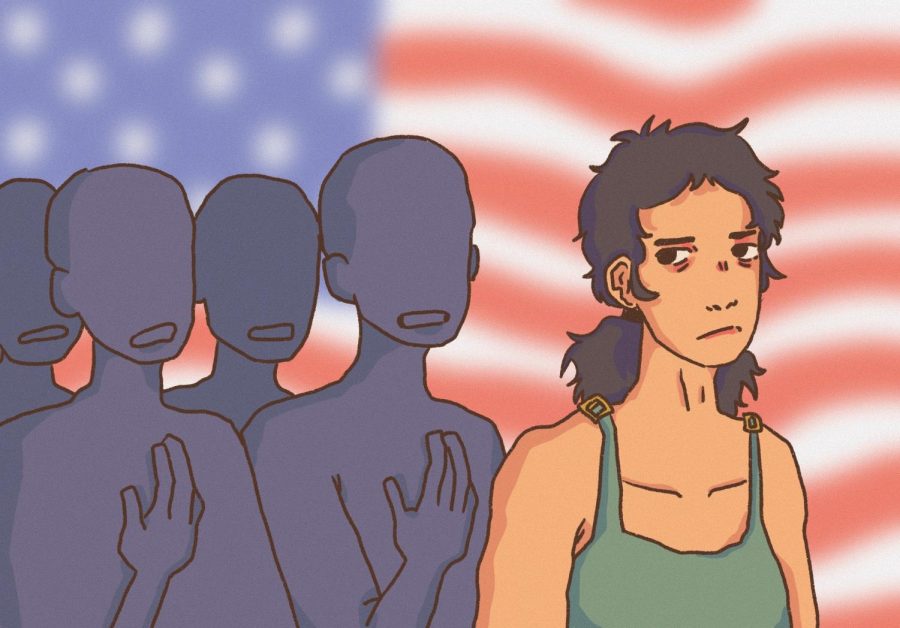The Pledge of Allegiance needs to be left behind
Opinion Editor Jeffrey Dratch writes that the Pledge of Allegiance has a harmful past and should not be recited in schools.
October 31, 2022
Since the late 1800s, the Pledge of Allegiance has been a staple in American public schools, and American culture in general. For many people, including the majority of Algonquin students, the pledge is simply a part of the beginning of the school day. However, many people fail to recognize the truly hideous past that the pledge traces to its roots.
The Pledge of Allegiance began in Massachusetts, crafted by former pastor Francis Bellamy to create greater patriotism and American legacy. The forming of the pledge led to American flags being placed in virtually every public school classroom, in addition to the speech being recited daily over announcements. The pledge’s inception certainly did what it was supposed to, creating greater pride for Americans.
What most individuals don’t realize is the problematic history behind the pledge, with a long past of xenophobia, white nationalism (the belief that white people are superior to all other racial or ethnic groups) and blatant racism. The earliest adopters of the pledge were mostly wealthy white elitists, who were extremely privileged and some of the few to have access to good education. According to a Washington Post article showing the discrimination present behind the pledge, Francis Bellamy sought to “define true Americanism” against the rising tide of southern and eastern European immigrants “pouring over our country.”
Bellamy was essentially expressing that a large influx of immigrants, especially from nations in eastern Europe, didn’t belong. The pledge led to alienation of Jewish individuals, people of color and immigrants. Decades of racial segregation in schools led to non-white individuals, as well as immigrants, feeling as if they don’t belong. However, over 130 years after the creation of the original Pledge of Allegiance, this dark and frankly disgusting past has been severely washed over.
Most educators and enforcers of the pledge don’t know the background carried with it, as well as students. However, according to a Massachusetts law, even though students cannot be forced to recite the pledge, the law states that “Each teacher at the commencement of the first class of each day in all grades in all public schools shall lead the class in a group recitation of the ‘Pledge of Allegiance to the Flag.'” Additionally, schools must have an American flag hung up in every classroom, with a flag also hung up in front of the school, every day of the school year.
During my first period class every day, a student council member picks up the phone and recites the Pledge of Allegiance to the entirety of the Algonquin community. I look around the classroom and the overwhelming majority are standing up, reciting the 31 word speech with their hand over their heart.
After realizing the past behind the pledge and feeling extremely frustrated with the pressing injustices in America, I have made the personal decision since fall of 2019 to sit down while others stand and recite the speech. I think it is important to acknowledge the reasons one might sit during the pledge, and respect their decision to do so.
For schools such as Algonquin trying to create an environment of equality and justice, promoting the Pledge of Allegiance with its dark history disagrees with this essence of equality. While the right to not participate in the Pledge of Allegiance is protected under the Supreme Court decision in the case Cantwell v. Connecticut, there is still significant social pressure to conform. Something so outdated, and fairly religiously based by including “under god,” violates the Freedom of Religion First Amendment right and should be eliminated by our state government and the federal government to show minorities that their own country loves them.
The Pledge of Allegiance holds a big part of American history, and is still recited by millions every day. However, with societal issues impacting daily life for millions of Americans, reciting this speech counteracts with many social improvements in the United States. Until state and federal laws change, as individuals, consider the history behind the pledge before you choose to recite it, and use your power as Americans to change legislation surrounding the Pledge.












Floyd • Feb 4, 2025 at 5:42 am
I was raised to copy what the teacher teaches.never was I able to no the truth about life until speaking to the people who are elders.its painful that people still today believe in hate,and that has become of all people.things are not the same today in some ways but are just as bad.maybe when I become an elder and all of the old ways will be abolished will we all as humans be greatful.
Mike O. • Jan 16, 2023 at 8:20 pm
Utter ignorance? Wow. I’m genuinely sorry this triggered you. The writer is correct that the creator of the Pledge felt that the recent (at the time) immigrants were inferior. You can google it. I’m glad the Harbinger is open to reviewing the traditions and beliefs of the past and is not afraid to call out the white washing when they see it. This is a high school paper, these are bright and curious kids putting their time and effort to create these stories. I’m terribly sorry but I think the previous comment is totally inappropriate.
Michael Sciacca • Nov 29, 2022 at 10:35 am
Utter ignorance… To think today Algonquin marks today USA Day. Well I’m sorry, you can’t have it both ways …to allow whilst allowing this garbage to be put to print, you are denigrating our national colors, values and symbols to that that of a costume …disgustingly disrespectful